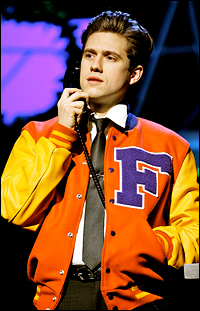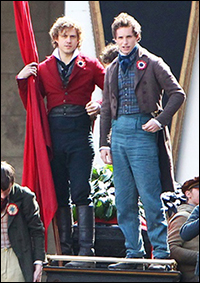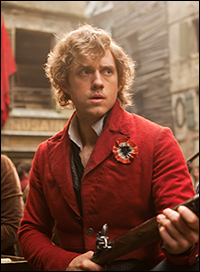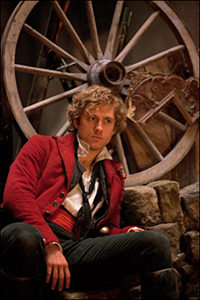
*
Enjolras — the committed, charismatic firebrand at the barricades in Les Misérables, and a Tony-winning role for Michael Maguire in the original Broadway production — is hardly a shy, retiring type, but he has been surprisingly M.I.A. at all the international red-carpet premieres of the picture save for one — New York City. (The film gets officially and widely released Dec. 25.)
The reason for this conspicuous omission is that Aaron Tveit — the actor who plays him in the epic visualization of Victor Hugo's 1862 novel and its 1985 stage musical translation by Claude-Michel Schonberg, Alain Boublil and Herbert Kretzmer — was in "Graceland" at the time. He has been since Halloween and will be till early spring.
This particular Graceland is not Elvis Presley's home in Memphis but a beach house in Southern California — and, true to curious Hollywood logic, it has been replicated in Fort Lauderdale, FL, for a crime series that will debut on the USA Network in May.
"I'm playing an undercover FBI agent, and basically it's a true story," the actor said by phone after a tough day of toiling on sand and surf. "In the 1990s, the FBI seized the mansion of a former cartel head who was so Elvis-obsessed he decorated his home like Graceland — and the law actually used this place in Southern California as a safe house for undercover FBI/DEA/Customs agents up until right after 9/11." Meanwhile back at the barricades, Tveit admitted he had seen the Les Miz movie — twice! — and has no problem shilling his little soul out for it. "I'm so, so proud of that film," he trilled. "Y'know, sometimes when you're working on a project, you can sense what you're doing is different or special — and it really had that kind of feeling.
"For one thing, they had six full weeks' rehearsal before filming, which is unheard of. I had four and a half weeks' myself. It was like a play, blocking it out on mock sets."
 |
||
| Tveit in Catch Me If You Can. |
||
| Photo by Joan Marcus |
Plus, he can content himself with the ensemble awards "Les Miz" picked up from the National Board of Review and from the critics of San Diego and Washington, DC, but the loudest Oscar buzz has been generated by his co-stars: Hugh Jackman (Valjean), Russell Crowe (Javert), Anne Hathaway (Fantine) and Eddie Redmayne (Marius).
 |
||
| Tveit and Eddie Redmayne in "Les Misérables." |
||
| Universal Pictures |
"This is something [director] Tom Hooper, Eddie Redmayne and I worked really hard on, trying to flesh out these real characters and tell the story in a more honest way. On stage, you get to suspend a little more disbelief, but, on film, you have to tell it in a very realistic fashion. Marius and Enjolras have been friends for a very, very long time — this, again, is using Hugo's novel as our bible — and, in the novel, Marius and Enjolras are very much together leading this group of guys until Marius goes off on a tangent with Cosette. It's the first time I've seen that in Marius. Usually, he's right there standing with me, fire in his heart, ready to fight — but, instead, he's going off at what just happens to be the most critical moment we ever faced, his head in the clouds, falling in love, and that creates a much more interesting conflict, I think."
Like the dutiful actor, Tveit returned to the roots of the story — the unabridged Victor Hugo, if you please. "It was tremendously long, but what was great was you not only got this amazing fictional story he's telling, but also after a few chapters he digresses into what was really happening in Paris and around France at the time of the story so it gives you all this historical context to his story. It's a fully fleshed-out world."
 |
||
| Tveit in "Les Misérables." |
||
| Universal Pictures |
The character first caught the actor's eye in the original Broadway Les Miz, circa the late '90s and sans Maguire. "I saw it once or twice when I was 15 and in the tenth grade," he recalled. "For people my age, it was a show that was really impactful. I'd seen shows before, but I think it was the first time I really had been emotionally invested in going to see a play on Broadway, and it really struck me. The heroic aspects really pulled me in. I remember it distinctly as being one of those shows that always stayed with me. Then, by the time I started working and got to New York, the timing was off. When I moved to New York, the original had closed and the revival was being cast and I was doing something else, so I kinda never got a chance to do it on stage. It was amazing to me that my first chance to be a part of it was in this film.
"I was always drawn to Enjolras and Marius because of the songs they get to sing."
The film deals his Enjolras a particular strong hand musically. "Basically, I sing the ABC Café song, which is the 'Red and Black' number and the 'Do You Hear the People Sing?' anthem. Also, it's the whole ensemble, but I have a great part in 'One Day More.' I get to sing a bunch. There's a lot of recitative and sung-through dialogue."
 |
||
| Tveit in "Les Misérables." |
||
| photo by Universal Pictures |
"I think that gives the film an immediacy than sometimes movie musicals don't have. When you're in the theatre, you go on that emotional ride. It's the music that ties you in, but I think that there's a disconnect sometimes in movie musicals when people start singing and you sit there as a member of the audience and think, 'Oh, they're singing now.' I think what's great about this movie is that doesn't happen because we sing live and it's the language of how these people communicate.
 |
||
| Tveit in "Les Misérables." |
||
| photo by Universal Pictures |
Of course, it's not the easiest trick in the world to pull off, and only practiced stage people need apply. "It's very difficult because you might do 15 takes of a song in a given day. You're doing it over and over and over again. Luckily, because I'm used to an eight-show week and what it takes to keep that kind of stamina on stage, I think I was able to prepare myself for that. I knew that the grind was going to be very hard.
"In essence, I treated it as I would treat any new musical that I was working on. I like to show off [on] the first day of rehearsal, having done all the work already. I know it musically, so, as soon as I got this job, about three or four months before we started filming, I got to work. I always want to make sure when I get there that I am focused on telling the story and what I'm doing as an actor, and I don't have to worry about the singing. I try to get to the point where I've done all the technical singing work to protect myself and I've learn how to sing it before I get there, so I treated it in the same way. By the time I got there, I didn't have to think about the singing anymore."
 |
||
| Tveit at the Dec. 10 New York film premiere |
||
| Photo by Joseph Marzullo/WENN |
Sure enough, regardless of the medium, the piper is still paid. On stage, a mortally wounded Maguire wound up beautifully draped over the barricade. On film [SPOILER ALERT!], a bullet-riddled Tveit comes flying out of a window into a similar artistic formation.
"We shot my death scene a couple of times. I think I fell out of the window while they shot at me maybe three times, but I was totally rigged. I went out smack against the building and then had to hang upside down for a bunch of minutes. It's such an iconic image from the stage production that they wanted to echo it in some way in the film. The ideals, the banners, that these students are holding up as a major theme in the film are symbolized by that image. It also represents the loss of innocence. It's a nod to the stage show, but it's nice they did something different."
It brings Tveit up short to realize he hasn't got his next musical lined up. "Y'know, I worked in development on Next to Normal for two or three years before we got to Broadway, and I first auditioned for Catch Me If You Can five years before we opened on Broadway, so the shows that I have worked on have been a part of my life for a long time. After this last year shooting the film and this pilot, it's the first time in ages I'm not working on a new musical. I literally dream about what I'm doing next."
Which is not to say he doesn't have some irons in the fire. He recently spent a week working with Angela Lansbury, Kelly Barrett and Aaron Lazar on an Anastasia musical — not a live-action version of the Ingrid Bergman/Yul Brynner/Helen Hayes picture of 1956, but the animated "Anastasia" that Lynn Ahrens and Stephen Flaherty musicalized in 1997. "Terrence McNally wrote the book. It was a joy to spend that week working with them. I think that they're getting ready to do it in Moscow next year with a Russian cast. I believe that next year will be the 400th anniversary of the Romanov dynasty so they're doing it in Moscow in conjunction with that."










